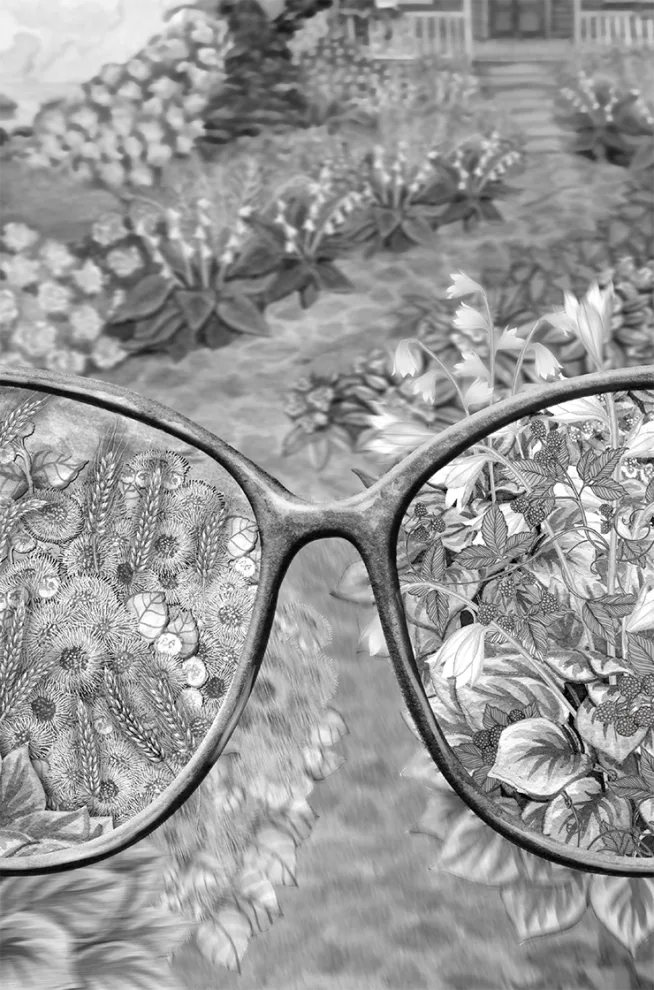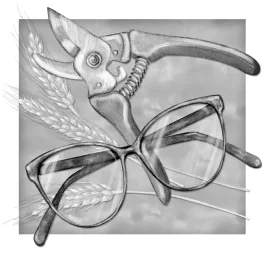
Working in my garden is a lot like raising my girls. I often think about what I should do to make both it and them beautiful and healthy and strong. And although I weed and discipline, sometimes it feels as though I’m not really making a difference. There always seems to be one more problem to sort out. The lawn needs mowing. Hair needs untangling. Weeds take over a flowerbed. Laundry piles up until my two daughters and I are sorting through it to find the least dirty thing to wear.
Right now, as I stare out my bedroom window, I see a poison ivy vine climbing up the dogwood tree. I am fiercely allergic. Contact with this plant always leaves me looking like a burn victim. I have often lain awake at night, regretting that I didn’t protect myself with long sleeves and gloves.
I’ve also lain awake at night regretting things I said to my children.
“What’s wrong with you?” I said to Genna once when she locked her keys in the car while the engine was still running. I know there’s nothing wrong with her. She just made a mistake.
Then she locked the keys in the car a second time.
“Again? What’s wrong with you?”
Dani, my younger daughter, carried scissors to the living room with the blades facing her chest. “Don’t be stupid,” I said. “Hold those things the right way.”
Late at night, when the girls are sleeping and I am alone having a cup of tea, I often relive the events of the day. The other day I cut a clump of weeds with my scissors because I was too tired to pull them out properly. In the process I also cut off a long stem of bleeding hearts. Then I remembered the cutting remarks I’d made to my daughters and realized they may do more harm than scissors.
“Don’t be stupid,” I said aloud—to myself!
That’s when I realized that maybe somebody besides my daughters needs more gentleness and tolerance. Maybe if I wasn’t so hard on myself, I wouldn’t be so hard on them.
How to do that?
I’ve taken up squinting.
Yes, a little selective blindness goes a long way in helping me enjoy the world around me. After all, if I don’t see a problem, I won’t be bothered by it, right? So the ryegrass is invading the hardy blue ageratum. If I squint, it blends right in. So Dani has a pair of shoes lying under the coffee table, another pair adorning the front entry, and two more in the dining room. I’m still squinting here!
Sometimes I have to squeeze my eyes down to tiny slits. When Genna returned from college this summer, I came home from a hard day at work to find two extra bureaus in my dining room and a television parked upside-down on the couch. I had to almost shut my eyes that time.
Outside, the blackberry bushes on the north side of the house grew right through the hostas and the caryopteris. My, I say squinting, what lovely white flowers they had in the spring! In July and August, my daughters and I were treated to raspberries just outside of our back door every morning with breakfast—we just had to move the patio table a little further every day. And now, in October, the Concord grape vines have reached out to the nearby Dragon Lady holly tree. If I squint, it all resembles a mother hugging her child.
Genna is 21 now and away at college most of the year. She gets A’s, holds a part-time job, and pays her own rent. I don’t even have to squint to realize that she is doing well.
I look at my younger daughter, Dani. She’s 11. Her hair is uncombed and wild with curls. Her clothes are, well, imaginatively mismatched. She has been following me around the house all morning, chattering away while I’ve been doing chores. And now she is standing very quietly by the window in her sister’s bedroom, which I have slowly been turning into an office now that Genna is away.
“Genna has the best view,” she says. This will always be considered her big sister’s room.
I walk across the room, stand at the window with her, and look down into the garden. It’s autumn. Many of the perennials are past their prime or overgrown or getting ready to sleep for the winter. There are apples rotting on the trees. The fruit vines are leggy. The walking trail has bits of grass growing up between the soiled chicken hay I used to line the path.
“This really is the best view,” she says. She leans close to the screen.
Dani doesn’t see the lackluster leaves, the thorny twigs. She doesn’t realize that the perennials are depressed and the path is full of chicken manure. The paths look like gold to her. She is remembering the raspberries of summer. She sees and smells the grapes on the vine. To her, the ten-foot Joe Pye weed makes a monumental statement. The fallen Silver Queen artemisia plants make a regal carpet in the flowerbed. The few remaining flowers of the obedient plants dance like fairies on their tendril stems. She looks at the bench under the grape arbor and sees the picture I took of her and her big sister there that now sits in a gilded frame on the living room piano.
“I think it’s beautiful,” she says, staring down.

I realize that she doesn’t see the things that are wrong with the garden. She sees colors and shapes and textures. She sees the life. She is seeing what I saw when I first imagined the garden, years ago.
I give her a small hug and squint down into the garden.
“I think so, too,” I whisper.
I think so, too. ❖
This article was published originally in 2015, in GreenPrints Issue #103.



